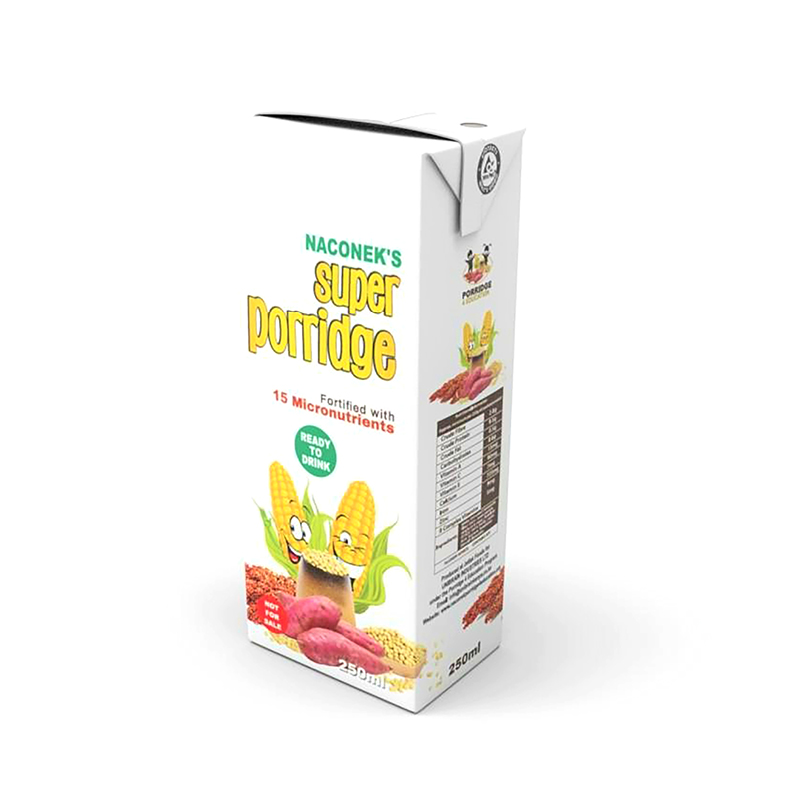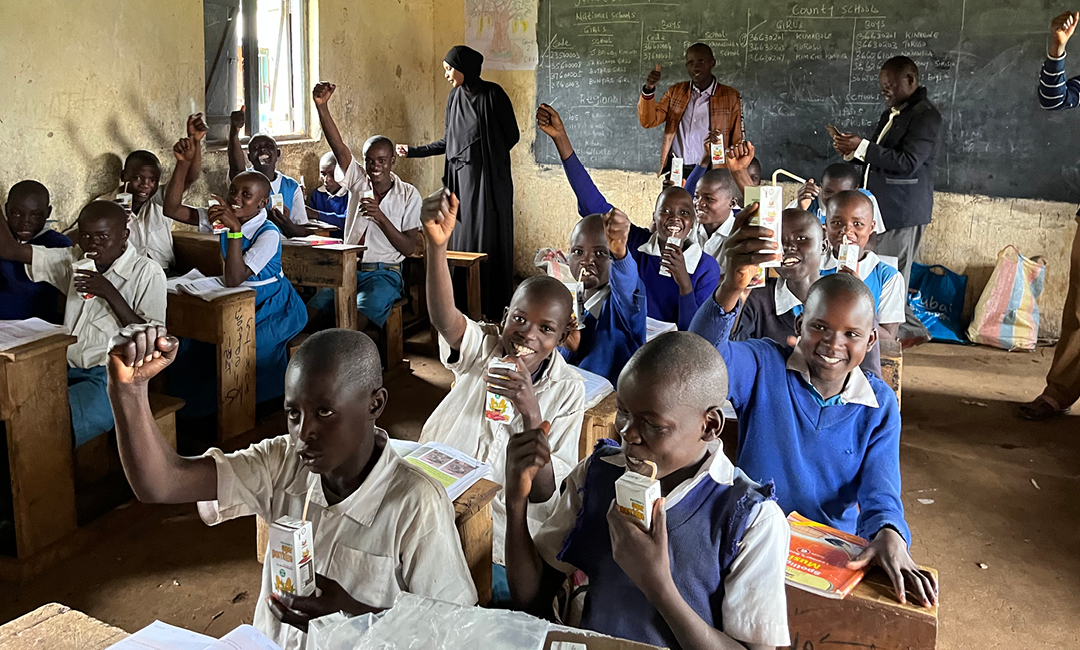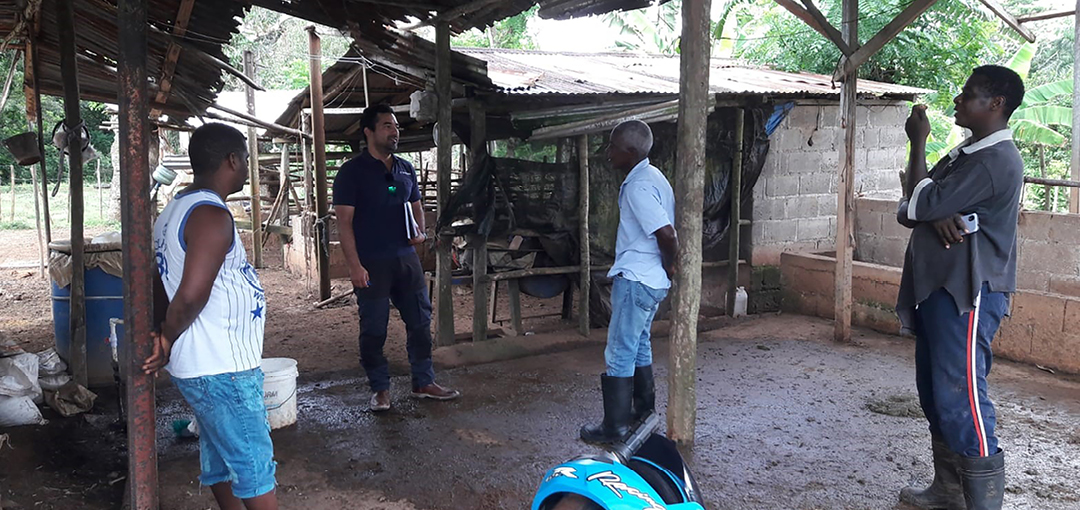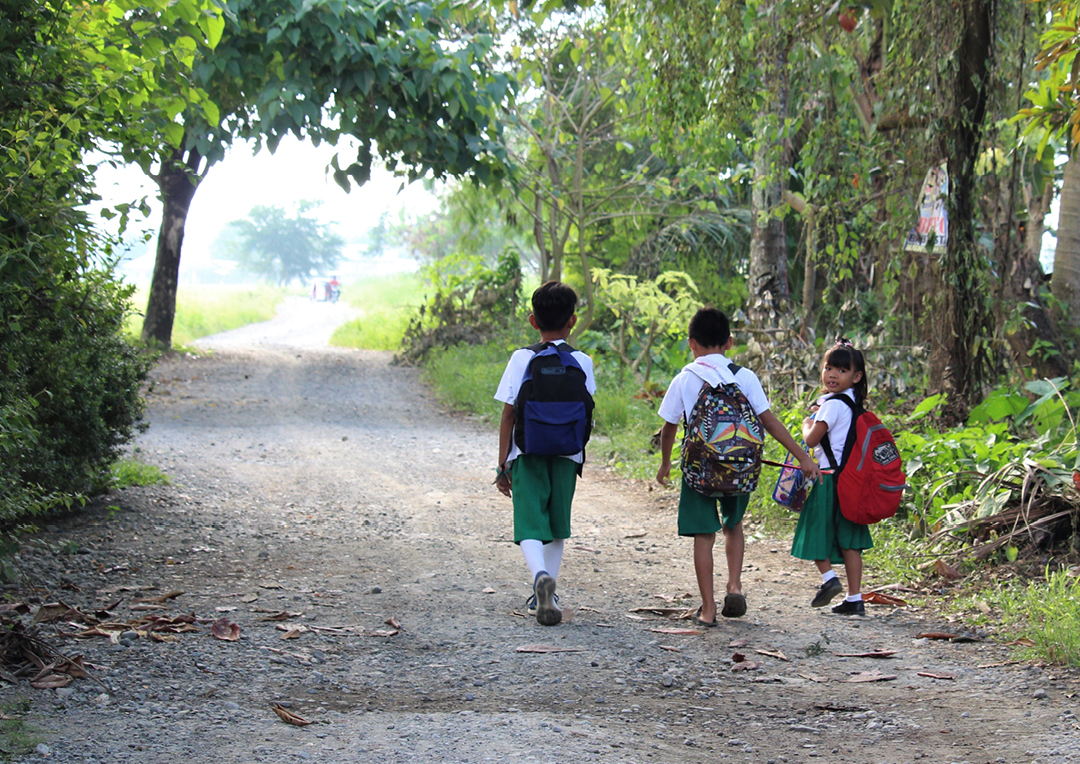![]() TETRA Laval SUSTAINABLE DEVELOPMENT
TETRA Laval SUSTAINABLE DEVELOPMENT
New Super Porridge combats child malnutrition and improves school attendance in Kenya
Tetra Pak and Food for Development are working with partners and collaborating with the Kenyan government to combat child malnutrition and improve school attendance in rural Kenya. A key part of the initiative has been the development of a liquid ready-to-drink cereal-based ‘Super Porridge’ for school children that is packaged in Tetra Brik® Aseptic 250 ml.


In the Arid and Semi-Arid Lands (ASAL) region of Kenya, food insecurity and malnutrition are major challenges for the 15 million people living there. The malnutrition rate in this region is 65 per cent compared to the national average of 29 per cent. In addition, 90 per cent of the 2.4 million children not attending school in Kenya live in the ASAL region, according to the Kenya Population and Housing Census (KPHC).
Porridge 4 Education Programme
As a key action, the ‘Porridge 4 Education Programme’ was implemented by the National Council for Nomadic Education in Kenya (NACONEK), a semi-autonomous government agency under the Ministry of Education. A survey conducted by NACONEK and UNICEF highlighted school feeding as a key initiative to bring back children to schools and address issues related to food security and nutrition. To address the issues of food safety and access to safe nutrition in schools, a collaborative partnership approach was established between Tetra Pak, Food for Development, Ingredion, DSM, and the Tetra Pak customer Jetlak Foods Limited to develop the liquid ready-to-drink cereal based ‘Super Porridge’ for school children.
The porridge is made from locally sourced crops, with an emphasis on locally grown climate-resilient crops containing maize, soy, sorghum and sweet potato. Ingredion, a leading global ingredients solutions company, contributed with their expertise and technology in texturising and stabilising solutions, and formulation development. Through the expertise of Royal DSM, a global purpose-led science-based company, the product is fortified with 15 micronutrients including vitamin A, C, E, calcium, zinc and iron. The fortified beverage is packaged in Tetra Brik® Aseptic 250 ml for safe distribution to schools.
Collaborating with technical assistance and sharing best practices
Food for Development has supported with the implementation of the pilot programme that is currently reaching 5,000 children across three counties. Baseline data has been collected to measure improved school attendance, enrolment and health. Product acceptability tests were conducted with the school children having an acceptability rate of 88 per cent. After the consumption of the porridge, the empty carton packages are collected and transported to a recycling facility in Nairobi to be converted into items such as school materials and desks.
The programme – from training, production, aggregation, processing, storage, transport logistics, marketing and consumption – will create 5,000 jobs for young people throughout the value chain. It will also help to create stable and secure livelihoods to address poverty among 12,000 smallholder farmer households that produce the cereals for the porridge.
The Dairy Hub model continues to boost dairy productivity and self-sufficiency
The Dairy Hub model, which helps Tetra Pak customers to connect with local smallholder farmers and milk collection centres, is helping to build more sustainable dairy value chains around the world.

Introducing the Dairy Hub model
The Dairy Hub model aims to secure a long-term supply of locally produced, quality milk, without raising the cost of collection in emerging economies. It does so by linking smallholder farmers to a dairy processor, with Tetra Pak and Food for Development offering the technology and ‘hands-on’ practical knowledge and training.
The model links smallholder farmers to a more stable market through a committed dairy processor willing to invest in the local milk supply chain. The farmers receive training and technical support from local Extension Officers that are focused on improving farm profitability and development. The Extension Officers in turn receive technical training from dairy experts at Food for Development, and then share their knowledge with reference farmers, who transfer it to a wider community of farmers.
Increasing milk production in Panama
The local dairy sector in Panama annually produces around 180 million litres of milk while the domestic demand is 480 million1), including fluid milk, various national milk products and imported dairy products. Smallholder farmers struggle with low incomes and a low average daily yield of 3.8 litres per cow2). To support the development of a more self-sufficient dairy sector, Tetra Pak customer and dairy processor Industrias Lácteas, S.A. with the support from Tetra Pak and Food for Development, has introduced the Dairy Hub model.
There were improvements already in the first few months of the project in 2022, where milk collection increased 8.5 per cent, from 106,000 to 115,000 litres per day. The reference farms also improved milk yield per farm about 4.4 per cent, and the average smallholder farmer gross income increased 4.2 per cent compared to before the hub.
Creating a more self-sufficient dairy sector in the Dominican Republic
While the Dominican Republic’s dairy sector is an important source of local employment, it is not able to supply the full range of dairy products consumed domestically. Dairy processors source all the locally produced milk that meets the quality standards and cooperate with farmers and milk collection centres to improve compliance with these standards. However, the Ministry of Agriculture estimates that about 70 per cent3) of milk produced does not meet the standards due to inadequate sanitary standards and cold chain limitations.
To ensure a more self-sufficient dairy sector and supply of local quality milk, a Dairy Hub model has been introduced by Tetra Pak customers Coopesur and Agampta, together with Food for Development.
Coopesur is working with 40 reference farms that will benefit from the project during the first year. In the first few months, the farmers reported a 15 per cent average increase in milk production per farm compared to the baseline prior to their involvement in the Dairy Hub. At the 18 reference farms that Agampta is working with, milk production increased on average by around 21 per cent compared to the baseline. In addition, Coopesur reported an increase of smallholder farmer income by almost 15 per cent on average and Agampta by 26 per cent. Both companies also presented an improvement of productivity per cow and the total collection of raw milk.
1) El Ministerio de Desarrolló Agropecuario (Mida), 2021.
2) El Ministerio de Desarrolló Agropecuario (Mida), 2021.
3) Source: Dirección General de Ganadería (DIGEGA)

School feeding programme addresses malnutrition in the Philippines
One in four children in the Philippines are considered to suffer from malnutrition. To address the problem, the Department of Education has launched a national school feeding programme. Tetra Pak and Food for Development play an active role in the programme by sharing best practices in food safety and providing technical assistance so children can have access to safe nutrition.

School feeding and nutrition programmes around the world have proven to have a major positive impact on children’s physical health, development and learning outcomes as food at school often is the first meal of the day for many children. They have also proven to play an important role in supporting local agriculture development.
According to the Philippines Expanded National Nutrition Survey, one in four children aged of five to ten are underweight. One in four children are ‘stunted’ (below their expected height for their age) and 7.8 per cent of children are ‘wasted’ (below their expected weight for their height).
To address these challenges, the Department of Education introduced a School Based Feeding Program (SBFP) with the objective of improving nutrition and school performance among school children. As part of the initiative, a law was passed by the government to institutionalise a national school feeding programme for undernourished children in public day-care, kindergarten and elementary schools. The national school feeding programme benefits 1,837,000 children, mainly from five to twelve years of age. As part of the meals, fortified white milk and flavoured milk are being prioritised as a valuable source of nutrition.
UHT milk in Tetra Wedge® Aseptic
Tetra Pak and Food for Development provide technical support to the school feeding programme where they share best practice in the organisation and implementation of school milk programmes, as well as provide environmental education. To tackle the infrastructure problems and the lack of refrigeration, Ultra High Temperature (UHT) milk in Tetra Wedge® Aseptic 200 ml Slim packages have been introduced to ensure that children in various parts of the country have access to safe nutrition. In the first phase, the UHT milk is being distributed by Tetra Pak customer RFM Corporation in three of the seventeen regions in the country, covering almost 360,000 children.
Long engagement in school feeding programmes
“For decades, we have been working with our customers and relevant stakeholders to support school feeding programmes around the world because we believe they are effective in addressing poor health and nutrition in disadvantaged communities,” says Michael Wu, Managing Director, Tetra Pak Malaysia, Singapore, Philippines, and Indonesia. “We commit to making food safe and available, everywhere. This is why we make sure that school children get all the goodness of milk to have the energy to stay in school and get that brain boost they need for learning.”
“Milk helps school kids reach their physical and cognitive potential. Aside from making it accessible, it is imperative that the milk stays fresh and safe even as we transport it to hard-to-reach areas or those with limited storage facilities,” says Marie Concepcion-Young, Senior Vice President and General Manager, Consumer Group of RFM Corporation.